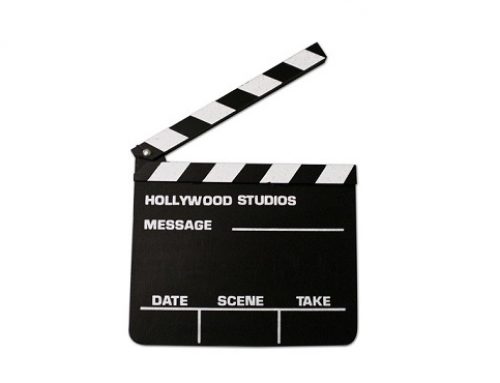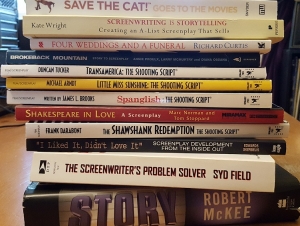An Idea vs. a Premise
by Renée J. Lukas
 We writers are often immersed in our stories for so long, it’s sometimes hard to sit back and look at the big picture of our story. Sometimes, while writing our treatment, the story still feels like a piece of dough that’s not taking shape. If your story is lacking in some way, ask yourself if you truly have a story worth telling on screen. How do you know? It needs one key ingredient:
We writers are often immersed in our stories for so long, it’s sometimes hard to sit back and look at the big picture of our story. Sometimes, while writing our treatment, the story still feels like a piece of dough that’s not taking shape. If your story is lacking in some way, ask yourself if you truly have a story worth telling on screen. How do you know? It needs one key ingredient:
A strong idea. Yes, I know this sounds basic. It seems like it should go without saying. But ask yourself this: do you really have a story that can work as a two-hour feature film? Is there enough meat there? It’s not as easy as it may seem. So often an idea seems wonderful at three a.m. Then, as you try to develop it more, you realize that what you really have is only a premise. I’m so good at coming up with premises, I should’ve started a business called The Premise Factory. But a premise—or concept—won’t get you from page one to page 120. The difference between a premise and a full-fledged “idea” is a second and third act.
A premise sounds something like this:
A time-traveling man.
Great. Cool. But it doesn’t go anywhere. It sounds more like the set-up.
To get it out of premise mode, ask:
- Why is he time traveling?
- How is he able to time travel?
- What are the consequences of this time traveling? Will the consequences raise the stakes?
An example of taking this premise to a strong idea:
A playwright visits an old hotel and falls in love with an actress who performed there in 1912. Actually, he falls in love with her photograph, but whatever. He visits an old professor who’s an expert on time travel, and, using the professor’s methods, he’s able to go back to 1912 and meet this woman. But can they live happily ever after when her overzealous manager is determined to keep them apart?
There you’ve figured out an intriguing reason for his time traveling, how he’s able to do it, and the stakes involved once he meets her. Of course, this is the premise and idea of Somewhere in Time, which I highly recommend as long as you have plenty of tissues and no one around to watch you ugly cry for two hours.
5-Point Checklist to Craft a Strong Screenplay Idea
If you’re like me, you may jot down ideas in notebooks scattered all over the house or in a special journal on your nightstand. As you mine through these ideas, trying to find the next gem, ask yourself the following questions to see if it can be developed into something more:
- Why? This applies to any idea. Why does this man want to risk his life to go to a strange planet? Why is this woman in prison? “Why?” will get you thinking in new directions. It’s also an important question to have ironed out before you type “Fade In.” Once when I was teaching a screenwriting class, a student (whose story I’m totally making up to protect the real person) was explaining to me in great detail about an outer space adventure story. This guy was doing this. This other guy was doing that. I stopped him dead in his tracks when I simply asked, “Why?” He couldn’t explain why his protagonist was traveling to outer space. He just was because it needed to be part of an action-packed story. But it didn’t make sense to have him fly out there for no reason. In fact, more than one student could be tripped up by that simple question. And you’d better have an answer.
Believe me, your audience will always ask why if you leave a plot hole or character motivation hole. I can’t tell you how many times I’ve watched a film or TV series and wondered why a character(s) is doing what they’re doing. In Stranger Things, I kept asking why the characters were all so willing to go down to the dark basements and creepy places in the hopes of finding the scary thing! I could only answer my own question with, “Well, they have an overdeveloped sense of curiosity that I just don’t have.” I would’ve gotten the heck out of that town.
- What is your theme? What are you trying to say? Without preaching, your world view may lead you right out of premise land. What subject would you like to explore with your audience, showing both sides of an issue? Your theme usually informs your ending, so this could help fill in many blanks. Erin Brockovich was a real David and Goliath situation, and you couldn’t imagine that this struggling woman driving a car that belongs in a junk heap could ever get the best of a mammoth corporation.
- What is the most dramatic character arc you can have with this idea? A character fighting a big corporation then becoming part of the machine, a prejudiced character who unexpectedly needs help from the minority group he hates, a greedy character whose life is changed so much they give up everything for a greater cause. Remember, the more transformed the character is, the better. Who they are at the beginning should not be who they are by the end. In Thelma & Louise, timid housewife Thelma becomes an outlaw and finds her voice. In Avatar, not only did Jake change his world view, but also his species. It doesn’t get more dramatic than that!
- What are the stakes? As mentioned earlier, if you can identify high stakes, you’ll go from premise to idea. What a protagonist has to lose is important and even better if it’s something big. But this doesn’t always have to mean their life is on the line. Losing an important family heirloom, a lot of money, a true love—and not necessarily in that order. A simple object doesn’t stay simple if you play with the context. For example, in one of my favorite Twilight Zone episodes, a man who loves to read more than life itself survives a nuclear war and finally has all the time in the world to read books. Then his eyeglasses break, cracked into pieces. A simple pair of eyeglasses was the key to this man’s happiness. If it’s not an object, consider something intangible. What if a character stands to lose his integrity, self-respect, faith in humanity?
- Can you picture the film poster? This may seem crazy, but if you can truly visualize a movie poster with a tagline—“In space, no one can hear you scream.”—it can help send your imagination down a pathway that might help you flesh out your premise into a really big idea.
Hopefully, you can identify your idea early on so that you’ll have a detailed treatment just waiting to take script form. If you should awaken at three in the morning with a premise so strong, burning inside of you, write it down. The next day, take that premise and ask as many questions as you can until you can see a film start to take shape. Then you’ll really have something special.
Good luck, and keep writing!




